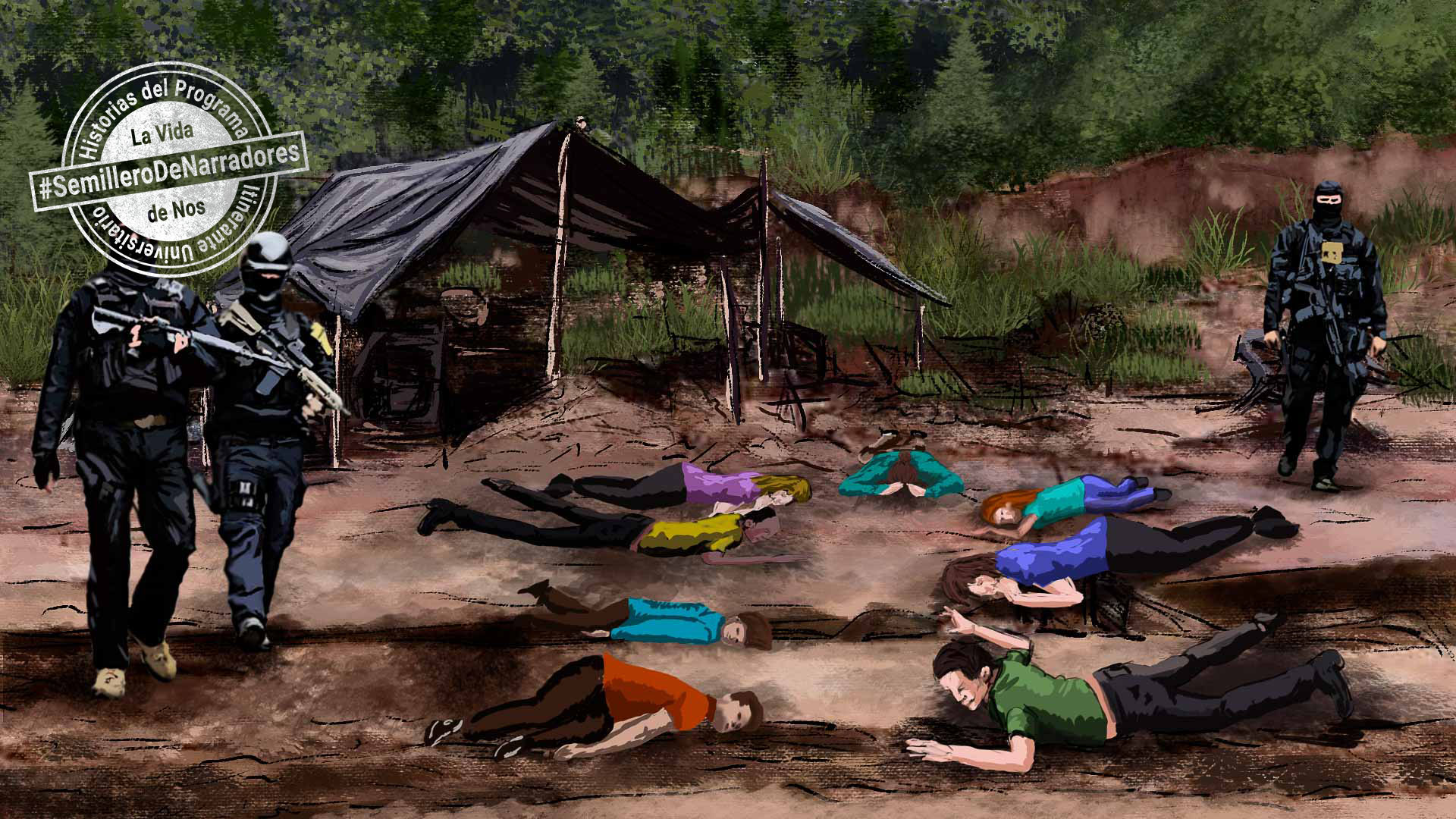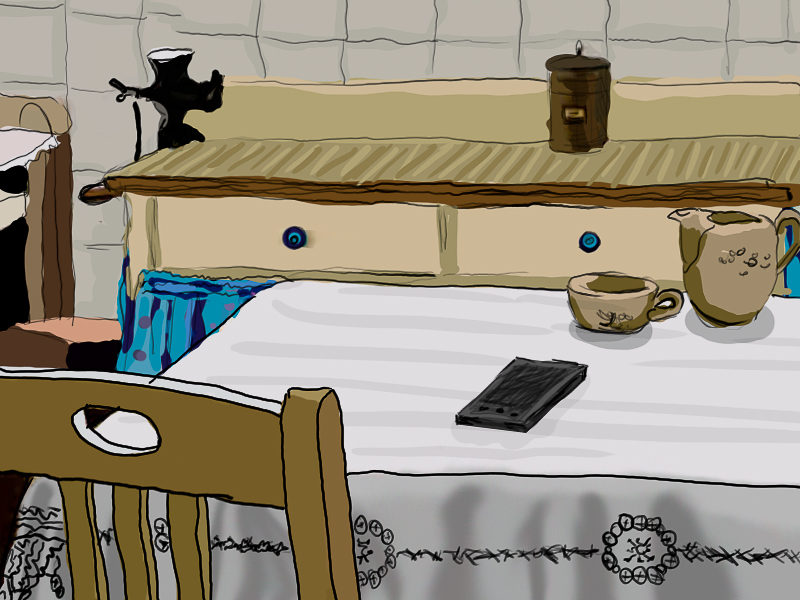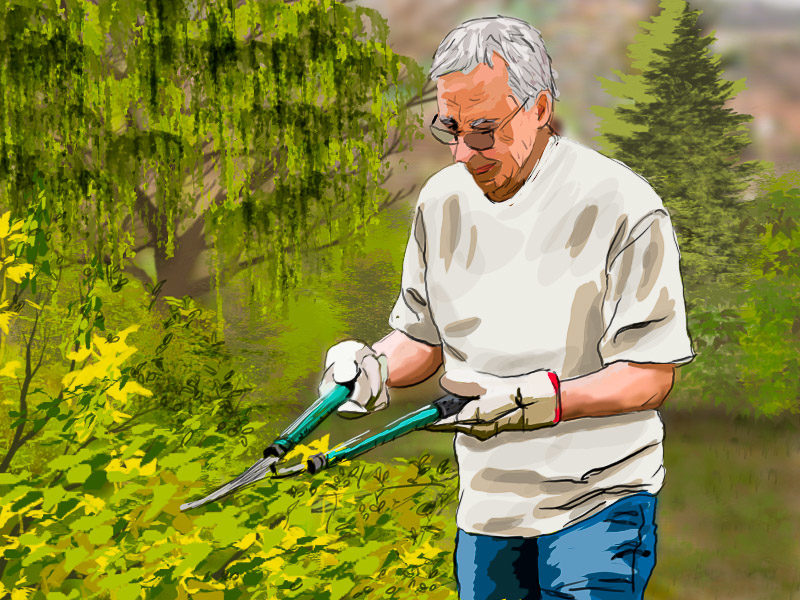

 There was a time when Mr. Luis would go to the mines in the state of Bolivar, in southern Venezuela, to dig for gold. Now, 30 years later, it is his children, his grandchildren, and his wife who spend long periods there, struggling to provide for the entire family. As for him, he rather stays in Ciudad Guayana working as a gardener.
There was a time when Mr. Luis would go to the mines in the state of Bolivar, in southern Venezuela, to dig for gold. Now, 30 years later, it is his children, his grandchildren, and his wife who spend long periods there, struggling to provide for the entire family. As for him, he rather stays in Ciudad Guayana working as a gardener.

 Image Credit: Carmen García
Image Credit: Carmen García
Here comes Mr. Luis, approaching in the distance. He is wearing worn-out boots, faded jeans, and an old shirt from the Siderúrgica del Orinoco [a state-owned steel corporation] that one of his customers gave him years ago. He is not from around here. He lives about 25 miles away, specifically in Ciudad Guayana’s rural area of Palo Grande, in the state of Bolivar, south of Venezuela. Today, it took him three and a half hours and three different buses to travel the 19 miles or so that separate his home from the residential area where he works.
As he does every day, Mr. Luis got up at 4:00 in the morning. He brushed his teeth, got dressed, and had an arepa with margarine and a large glass of water for breakfast. When he finished, he set out for work. His tools? A rusty machete, an old welding glove, and a cap.
Luis is 59. He has been working as a gardener in the area for more than a decade. It is a trade that he learned from his father and grandfather. He mows the lawn, cleans the edges of the gardens, and sows fruit seeds and some vegetables.
The neighbors know a thing or two about him. They know, for example, that for the past two years, his wife, children, and grandchildren have been spending long periods in the gold mines of El Callao, in the northeast section of the state of Bolivar, trying to get hold of nuggets of the precious metal that they could sell afterwards. It is a perilous practice, for the mines have been under the control of criminal and military gangs ever since 2016. People are killed there. People go missing and are never heard from again. Diseases proliferate there. Luis’ family knows as much, but they have decided to take the risk nonetheless because no other trade will provide them with enough money to bring home the bacon.
That is why many a neighbor ask Mr. Luis about them when they run into him.
“They are fine, working; I hope to see them soon,” he answers, although you can tell by his tone that he is not so sure about it.
Not everybody knows it, but there was a time when Mr. Luis would often go to the mines too. It was a long time ago, 30 years ago, and the perils of mining for gold were quite different. Like many, he would travel as far as kilometer 88, near a mining town called Las Claritas, about 217 miles from home, where he would stay for stretches of up to one month with his father-in-law and brother-in-law, digging in the dirt, trying to find gold.
“You would get in like you owned the place,” he says, reminiscing of that time.
And he smiles.
He is moving forwards and backwards in a rocking chair. He recalls that day when he almost hit the jackpot. He was in the mine with his brother-in-law. They dug a hole. They were sure they were going to make billions because they could already see small pieces of gold several meters underground. It was sort of a buried treasure. They kept digging for several hours, and then midnight came, so they put away a few grams and went to sleep, tired as they were. The next morning, when they woke up, they found out that other people who worked in the mine had taken the rest of the gold they were going to mine.
He never ever came close to finding anything like that again. Over the next few months, he got no more than a few ounces, which were not enough to cover expenses because he already had a wife, two children, and another one on the way. While he was away, working to feed his family, his wife Yudith was cleaning houses in an effort to contribute some money, but it involved leaving the children in the care of the neighbors or the children’s grandfather. That’s why she couldn’t do it so often.
Mr. Luis’ trips spelled uncertainty. From Yudith’s perspective, it all meant instability for the family. She felt that she and her children needed her husband to be there with them. So, as time went by, they both made the decision that it was best that he quit mining and focus on gardening. And that’s what he’s been doing ever since.

They added more children to the family for a total of eight, who eventually came of age. Mr. Luis increased his workload over the years. The country had changed and what he earned was less than enough to provide for the household. Some of his children would chip in from time to time. But then the country’s economic crisis worsened, and it all came to a point where they could not afford to have three meals a day, no matter how hard he worked.
Yudith felt that she had to be more than a housewife and do something to help put food on the table. And even though it was Yudith herself who had insisted years ago that Mr. Luis stop mining, she began to suggest that he return to the mines so that they could mitigate the effects of the crisis. It seemed the most logical choice to her: their children were already grown up and her husband had the experience. This time she would go too.
In 2017, it stopped being just an idea and they decided to go to the mines. Yudith, her children and grandchildren already knew what to do when they arrived in El Callao: the men would open up the holes in the ground and the women would make the recortes, that is, they would use water to remove dirt from whatever gold material they could find hiding in it.
But Mr. Luis refused to go. He begged them not to go. He warned them that things in the mines were not as they used to be. “People go there… and never come back”, adding that he could not resist a day’s work because of his age.
Yudith was aware of the risks, and yet she insisted that they had no choice. In August of that year, scared but determined, she left with her children and grandchildren for El Callao.
Luis stayed home.
As they were leaving, the family agreed that they would call him every day at 6:00 p.m., without fail.
At the mine, one of Mr. Luis’s daughters worked wonders to find spots with a strong signal to call him.
During those calls, Mr. Luis’ wife and daughters asked him to reconsider his decision to stay and join them in the mine. They insisted that with his experience they could surely make good money. But he did not change his mind.
And they would tell him how they were doing… and he would learn that one of his children had malaria, and then another one, so it eventually stopped shocking him. He tried to stay optimistic. He would not tell them that there had been yet another rise in the bus fare, that he had fewer jobs, or that there were times when he could not buy bread for dinner. He didn’t want to worry Yudith. He did his best to buy food for when they would all come back.
The night of October 29, 2019, he was back home after a long day’s work. It was already 7:30 p.m. but the phone had not rung. Nor did it ring at 8:00, or at 9:00, or at 10:00. He found it unusual and got worried, so he decided to call them, but no one answered. “Maybe they are tired and went to bed,” he thought.
He went to bed too, but he could not rest. How come they had not called him? They always did, even on bad days.
The next day, still with no news about his family, Mr. Luis had to go out to work. Time passed more slowly than usual and he felt that the heat was excruciating and that the streets were noisier.
And then, in the afternoon, the phone rang. It was Yudith. She told him why they had not called.
The day before, at 5:00 a.m., officers from the General Directorate of Military Counter-Intelligence (DGCIM) broke into the camp where the people who worked in the Cuatro Esquinas mine in El Callao stayed at night. All men and women were dragged out of the plastic-bag huts where they were sleeping, and about 30 of them were beaten and forced to lay face down on the ground and told that they would be killed if they dared to look up… including Yudith and Mr. Luis’ children.
“It is not you we are after, but I will kill anyone who moves or lifts his head off the ground,” exclaimed one.
There was yelling, and gunshots could be heard. They were surrounded by officers who were running up and down, giving orders to kill people. Yudith was breathing rapidly as she listened to two woman pray the Our Father next to her. She was aware that military officials and the thugs who control the mines were settling scores. She had already seen the bodies that the “settling of scores” left hanging from the trees. She had also heard stories about hands and tongues being cut out of those who disobeyed. Thinking about all that, she said to herself that she needed to stay calm.
Even in broad daylight, it was difficult to determine how many had been killed. They spent the whole day lying on the ground. A few hours later, a hot liquid got into Yudith’s pants: a man right next to her was peeing on himself.
It wasn’t until the night came that they were all ordered back to their huts.
“Everyone acted as if nothing had happened; no one said a word about yesterday’s event; everyone went back to their business as they do every day,” she told her husband.
When they hung up, the first thing on Mr. Luis’s mind was that he had to go get them. But he didn’t have enough money to pay for the fare. And even if he found a way to get there, he didn’t know if his wife and children could afford the trip back home.
He remembered that, days before that trip, he had given them the news that he was also going to offer his services as a gardener in Los Olivos, another sector of Puerto Ordaz. He was excited. He told his family that, if he worked more hours, they would not need to return to the mines; besides, the men in the family could join him because they all knew the family trade.
Yudith thought it was naïve on his part.
“We’ve already discussed it, Luis. You know that, at some point, it will not be enough and that we will have to go back to the mine,” she replied that day.
And off she went to El Callao again.
Mr. Luis can’t stop recalling that conversation.
And after that call, every time he talked to them over the phone he would insist on asking: “When are you coming back?” He did not want to pressure them, but he could no longer cope with the panic that had been eating away at him for days. He had been working side jobs to raise money to go get them, but it still wasn’t enough.
“How much money did you make today?” he once asked one of his daughters.
“Just a few grams, but we have to give the syndicate a cut of what we made,” she replied.
They had to give the syndicate, that is, the gang leaders or pranes who control everything in the mine, a share of what they got out of the mine. It is the pranes who decide how much they should be paid for all the gold they mine, and it is also them who decide whether or not they are allowed to work and stay there.
“What’s the worst thing that can happen to you?”, Mr. Luis wonders. “That you get killed by the pranes; that you get killed by the DGCIM; that you are never heard from again; that you are kidnapped and enslaved… You can also get trapped under a gallery and die buried in the hole you dug yourself. Getting infected with malaria is not even close to the worst of it; it will only slow you down, though it could cause you more problems. But the worst thing that could happen is that you arrive home empty-handed with nothing to offer your family.”
Mr. Luis could not make the trip to Cuatro Esquinas to get his family back. Fifteen days passed before Yudith and her children were able to pay the vacuna [a “fee” that has to be paid to the pranes] and return home for a few days. By then, Mr. Luis had already doubled his hours, just as he had promised them. He had also managed to fill the kitchen’s cupboard with some food, though he knew that it was no guarantee that they would not return to the mine.
The terror of that 2019 October day still echoes in his head. It is the clearest reminder that his worst fear can come true. That he can be left all alone, with food in the house, but with no one to sit at the table to share it.
Back in the neighborhood where he works, Mr. Luis no longer rocks in the chair or smiles as he reminisces of the past.
He is cutting the grass in the last section of the garden.
Translation: Yazmine Livinalli
 This story was produced within the framework of the La Vida de Nos Itinerante Universitaria program,
This story was produced within the framework of the La Vida de Nos Itinerante Universitaria program,  which offers workshops on real-life storytelling for university students and professors from 16 Social Communication schools in seven Venezuelan states.
which offers workshops on real-life storytelling for university students and professors from 16 Social Communication schools in seven Venezuelan states.

1564 readings
I am currently studying the last semester of communication and media at the Andrés Bello Catholic University, Guayana Campus. I am passionate about stories and a great defender of women’s rights. I am human. I am a journalist. #SemilleroDeNarradores [Seedbed of Storytellers].
Un Comentario sobre;